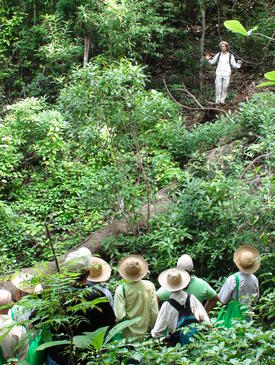Tropical Forest Restoration Strategies
Summary
Understanding the fundamentals underlying forest ecology and the use of tropical forests has become indispensable to manage the provision of ecosystem services in a sustainable manner in highly fragmented landscapes. While in recent years valuable information has been generated in multiple research projects, it has not been effectively transmitted to the various stakeholders that influence the management of forests. In fact, within Panama and Latin America there is a great need for training opportunities to help guide informed decision making about the management, use and restoration of tropical forests. Since 2006 the Environmental Leadership and Training Initiative (ELTI) has been facilitating conferences and training courses in order to provide different stakeholders with the knowledge and tools on how to conserve and restore forests and biodiversity in the tropical regions of Latin America and Asia.
This field-based course will take place at ELTI's Focal Training Sites, established within long-term research areas of Yale F&ES and STRI; 1) private properties of the Pedasi District, a dry forest ecosystem, located on the Azuero Peninsula, which is highly influenced by conventional cattle ranching and large-scale agriculture practices and a growing tourism sector; and 2) STRI's Agua Salud Project area, a wet tropical forest ecosystem, located in the Panama Canal Watershed, which is a highly dynamic landscape of protected areas, critical watersheds, conventional ranching and agriculture and rampant urban development. As such, both sites are composed of unique biophysical and socioeconomic contexts, which illustrate the complex variables of conducting restoration in human dominated landscapes and therefore requires practitioners to strengthen interdisciplinary skills. In addition, ELTI's Training Sites convey ecological principles and current scientific research through its interpretative trail network, demonstration sites and model farms. Over a period of six days, the course aims to provide the technical basis necessary to design and implement restoration strategies to increase forest cover and the provision and regulation of ecosystem goods and services in human-modified landscapes. Participants will have the opportunity to learn via field-based observations, group exercises as well as exchange experiences, concepts and practical tools with ELTI facilitators and international experts.
Specifically, the course will include lectures and field visits to demonstration sites that illustrate the importance of the scientific method and practical approaches to developing informed restoration strategies. Participants will strengthen their knowledge and practice of forest restoration during the course and will be required to develop a restoration management plan for their individual projects as a final exam. This plan will help them identify project goals and objectives, best practices for implementation and management and monitoring protocols to insure its long-term success.
Content
Module 1: Forest ecology and the provision and regulation of ecosystem services
- Introduction to tropical forests ecosystems of Central America
- The provision and regulation of ecosystem goods and services
- Introduction to tropical forest dynamics
Module 2: Limitations for the restoration and provision of ecosystem services
- Introduction to regional and international drivers of tropical forest deforestation and degradation
- Ecological and social consequences of degradation and barriers to restoration
Module 3: Strategies for the restoration of ecosystem services in human-modified landscapes
- Importance of defining management goals and accounting for biophysical site conditions
- Tailoring restoration strategies to the socioeconomic and cultural contexts
- Principles and methods of forest restoration and the range of passive to active restoration strategies
- Financing the restoration of productive landscapes


